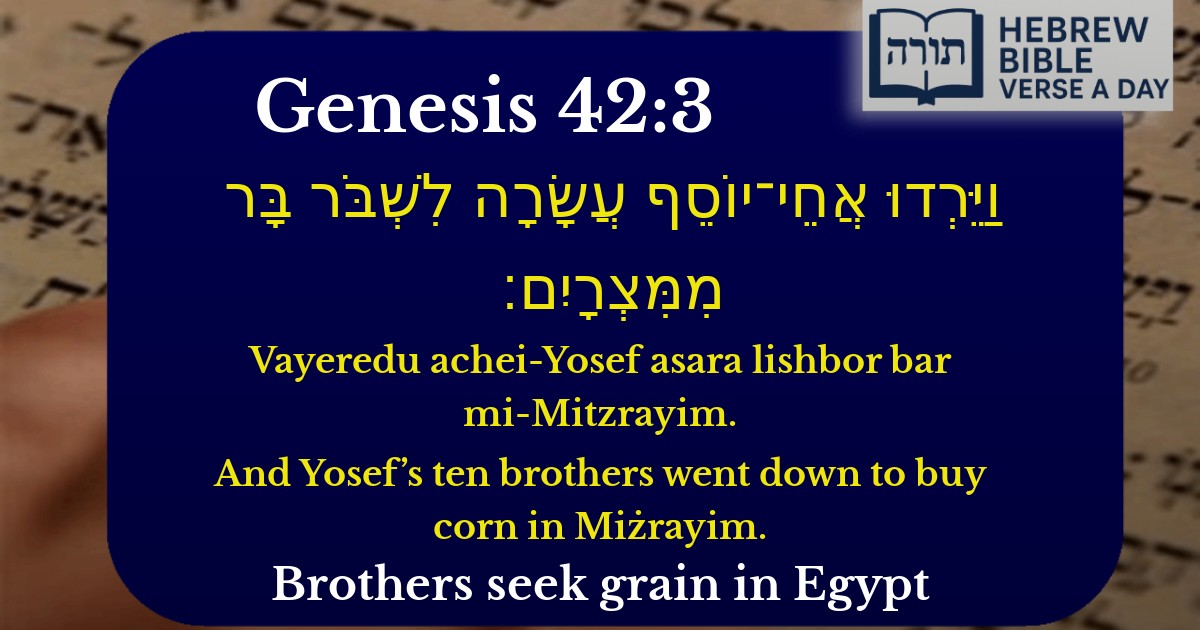Join Our Newsletter To Be Informed When New Videos Are Posted
Join the thousands of fellow Studends who rely on our videos to learn how to read the bible in Hebrew for free!
Hebrew Text
וַיֵּרְדוּ אֲחֵי־יוֹסֵף עֲשָׂרָה לִשְׁבֹּר בָּר מִמִּצְרָיִם׃
English Translation
And Yosef’s ten brothers went down to buy corn in Miżrayim.
Transliteration
Vayeredu achei-Yosef asara lishbor bar mi-Mitzrayim.
Hebrew Leining Text
וַיֵּרְד֥וּ אֲחֵֽי־יוֹסֵ֖ף עֲשָׂרָ֑ה לִשְׁבֹּ֥ר בָּ֖ר מִמִּצְרָֽיִם׃
וַיֵּרְד֥וּ אֲחֵֽי־יוֹסֵ֖ף עֲשָׂרָ֑ה לִשְׁבֹּ֥ר בָּ֖ר מִמִּצְרָֽיִם׃
🎵 Listen to leining
Parasha Commentary
📚 Talmud Citations
This verse is quoted in the Talmud.
📖 Taanit 10b
The verse is referenced in a discussion about the famine in Egypt and the brothers' journey to buy grain, illustrating the hardships faced during that time.
📖 Megillah 16b
The verse is cited in a broader discussion about the story of Joseph and his brothers, emphasizing the themes of providence and reconciliation.


Context and Significance of the Verse
The verse (Bereshit 42:3) describes the descent of Yosef's ten brothers to Egypt to purchase grain during the famine. This event marks a pivotal moment in the unfolding drama of Yosef and his brothers, setting the stage for their eventual reconciliation. The Torah emphasizes that ten brothers went down, excluding Binyamin, as noted by Rashi (Bereshit 42:3), who explains that Yaakov did not send Binyamin due to fear for his safety—a precaution rooted in the loss of Yosef.
Why Ten Brothers?
Ramban (Bereshit 42:3) elaborates that the number ten holds significance, as it represents a complete group capable of bearing witness or fulfilling a mission. The Midrash (Bereshit Rabbah 91:6) adds that the ten brothers corresponded to the Ten Commandments, symbolizing that their journey was part of a divine plan leading to the eventual fulfillment of the covenant with Avraham (Bereshit 15:13).
The Term "לִשְׁבֹּר בָּר" (To Buy Grain)
The phrase "לִשְׁבֹּר בָּר" is noteworthy. Rashi explains that "לִשְׁבֹּר" literally means "to break," alluding to the breaking of hunger through grain. The Kli Yakar (Bereshit 42:3) suggests a deeper layer: the brothers were not merely buying grain but were also "breaking" their own pride and arrogance, as their journey would lead them to confront their past mistreatment of Yosef.
Egypt (מִצְרָיִם) as a Place of Testing
The Or HaChaim (Bereshit 42:3) observes that Egypt was a place of spiritual challenge, foreshadowing the future exile. The brothers' descent mirrors the later descent of Yaakov’s family into Egypt, emphasizing divine providence in guiding events toward the fulfillment of the covenant.
Lessons from the Brothers' Journey